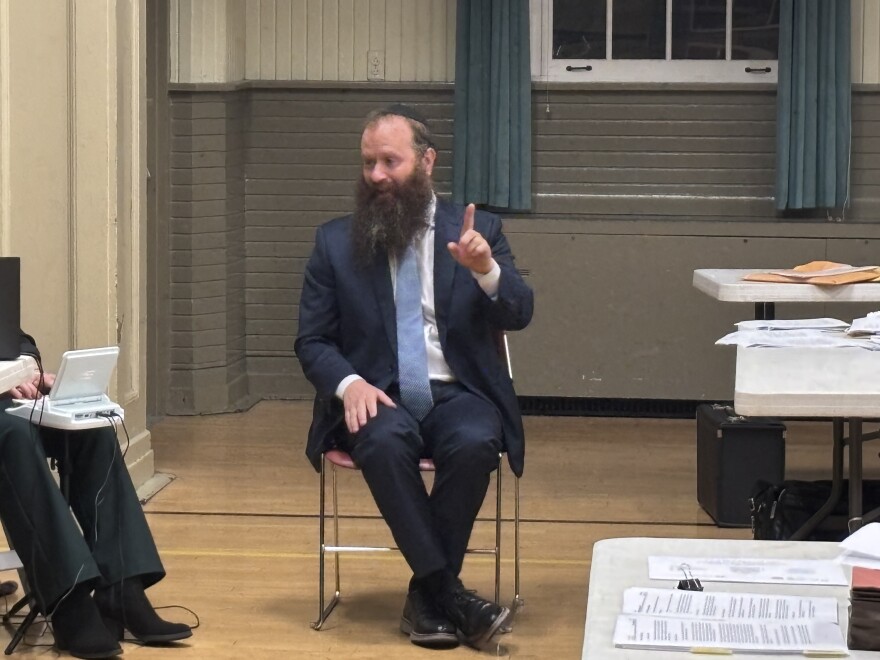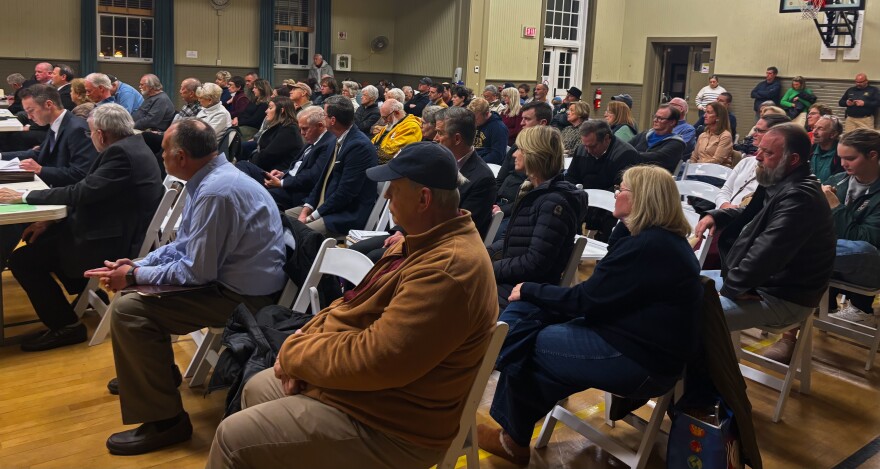After a tense three-hour hearing over the Chabad of the Abingtons, the Waverly Township Zoning Hearing Board continued its deliberations over a Jewish religious retreat to next month.
Rabbi Benny Rapoport, who was the only witness the applicant’s case managed to get through on Monday, wants to build 12 cabins on his 21-acre property in Lackawanna County for religious use. During his testimony, he described himself as not “God’s policeman” but “God’s salesman” in making Judaism accessible to Northeast Pennsylvania.
“I look at every single Jew as equally Jewish, meaning, just because I personally am observant, and that's the way I teach … I don't expect that somebody sitting at a [religious] class should live the way I'm living. I'm going to share the values, the traditions of Judaism, and allow people to take it to whatever level they're able to … I'm here to help you (Northeast Pennsylvania’s Jews) learn about yourself, really,” Rapoport said Monday night at the Waverly Community House.
Rapoport founded and runs the local Chabad and its Jewish Discovery Center on 216 Miller Road. His organization needs the zoning board's permission to build the cabins as Waverly’s zoning ordinance only allows places of worship to have two homes on the property to accommodate “full-time religious leaders and their families”.

Chabad teaches Hasidism, which is a subset of Orthodox Judaism in American Judaism. Hasidic Jews, and Orthodox Jews in general, do not drive during religious holidays such as Shabbat, the weekly day of rest for Jews from Friday before sunset through nightfall on Saturday.
Rapoport said he hopes to provide Jews of Northeast Pennsylvania, especially those interested in becoming more religious, a place to immerse themselves in Jewish traditions. He said his retreat will allow observant Jews a space for a religious retreat from secular life during the sabbath.
“[Each week,] six days we're in the world. On the seventh day we withdraw. Shabbat means to withdraw, to retreat,” Rapoport said to the roughly 100 people at the community center. He said Jews observe Shabbat by being mindful. He spoke as if he was giving a sermon.
“Even when we eat, we're mindful that the food is there to give us energy to serve God, right? … So [on] Shabbat, we don't cook, we don't clean … it's a day that we're actually focused on what's inside … what life really is all about, what God wants for me, what the gifts that I have around me, my family, my children … And then when Saturday night comes …and the stars come out, it's a little bit painful, because now we're thrust back into the mundane world. But we have Shabbat to carry us to the next Shabbat,” Rapoport said.
Controversy over proposed religious cabins in Waverly Township
Multiple attendees questioned whether the addition of 12 cabins, for a total of 36 bedrooms and a maximum capacity of 72 people would change the character of the community. The Chabad is located in the township’s rural resource district, a quiet area designated for agricultural use and some low density residential housing. It also currently has a weekly congregation of about 35 people with a max capacity of 120 people for services.
Lawyer Kevin Walsh, who is representing Terence and Margaret Neville, asked Rapoport several questions about the synagogue's current uses. The Nevilles have property on Miller Road.
Walsh did not say what his clients’ position is on why they are testifying on the Chabad’s application when WVIA News asked, but he did say that he would address it once he is given the floor to make his case at a future hearing.

Walsh asked Rapoport several times how many people currently live at the Chabad. Rapoport lives in a house on the property and has three tiny homes that are not in use following orders from the township.
Rapoport said that as of Monday night, only himself and his wife were staying on the property, but his large family, including seven children, five grandchildren and several cousins live on or visit often. He did not provide a definitive number, occasionally saying as high as 14 or more people.
The questioning became increasingly heated throughout the meeting. Rapoport repeatedly said to Walsh and residents, depending on the question, “Just tell me what you want to ask.”
Walsh seemed irritated by Rapoport’s responses, some of which were vague.
“How many people are living with you? This isn’t difficult,” Walsh said, his voice rising slightly.
Walsh also argued that having living accommodations, regardless of the length of time guests would stay, was not necessarily in line with Judaism and that the Chabad has operated since 2012 without providing its members with the option to stay overnight.
Abingtons residents concerned how local Chabad will change the community
Other attendees at the meeting said they were not properly informed that the rabbi planned to change the use of his property.
Caroline Nelson, who said her property on Waverly Lane is .8 miles away from Rapoport’s, said she should have been notified that people from outside of Waverly would be coming to stay overnight at the Chabad and questioned the safety of a shooting range on the property.
“What defines a shooting range,” Nelson asked. “Do you have to have it approved by the town? Is there a safety mechanism for it? You know, [to make sure someone does] not shoot my dog?"
Rapoport said his shooting range is for his personal use, including friends and family, but Chabad visitors are not allowed to use the range. He said Kenneth James, Waverly’s chief of police, has checked the range to make sure it is safe and follows township rules.
Michelle Tierney, a Glenburn Township resident and member of the Abington Heights School Board, asked whether the Chabad should be allowed to build 12 tax-exempt cabins on its property as it would increase the property’s value.
Rapoport answered that since the cabins are not dwellings, but are for religious use, it falls under the greater tax-exemption for places of worship model.
“It's not only for Jewish religious organizations, it's for all. So, we're all in the same boat. I'm sure the church that you go to doesn't pay property taxes — neither should they,” Rapoport said.
The Waverly Township Zoning Hearing Board continued Monday’s hearing to Monday, Dec. 1 at 5 p.m. at the Waverly Community House. Rapoport’s lawyers plan to call their next witness, including the project’s engineer, to the stand. If Rapoport’s lawyers finish their argument during that meeting, the Nevilles and Walsh will start to make their case against the project.


